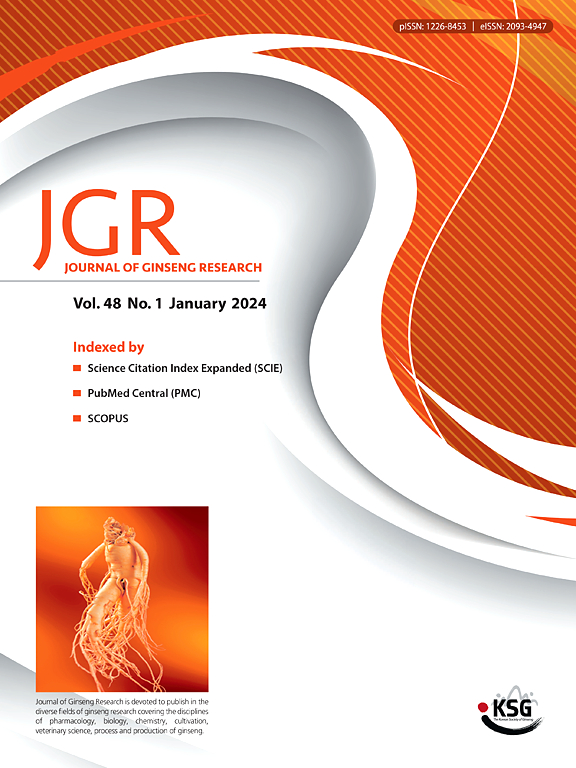人参适应作用的全面认识及其分子机制
IF 5.6
2区 医学
Q1 CHEMISTRY, MEDICINAL
引用次数: 0
摘要
人参是一种历史悠久的传统草药,在世界范围内得到了广泛的应用。植物化学研究表明,人参的生理活性是由多种活性化合物引起的,广泛的研究表明人参在各种生理和病理环境下具有适应原潜力。然而,支持其适应作用的分子机制仍未充分阐明,导致其适应特性被低估。这篇综述使用了全面的文献分析来研究人参提取物或衍生物的五种主要健康益处:抗炎、抗氧化、抗疲劳、心血管保护和增强认知。此外,它还对每项功效研究中发现的生物标志物进行了分类,并使用KEGG途径信息分析了它们的相互作用网络。通过这种方式,确定了人参适应基因属性的四个关键生物标志物:超氧化物歧化酶、肿瘤坏死因子、核因子红系2相关因子2和caspase-1。这些生物标志物在人参五大作用的表现中起着不可或缺的作用,对人参的适应效应起着重要作用。这种理解适应机制的新方法旨在为人参及其衍生物的药理作用提供创新的见解。本文章由计算机程序翻译,如有差异,请以英文原文为准。

Comprehensive understanding and underlying molecular mechanisms of the adaptogenic effects of Panax ginseng
Panax ginseng Meyer, a traditional herbal remedy with a long history, has been widely used worldwide. Phytochemical studies have shown that its physiological activity is due to a variety of active compounds, and extensive research has demonstrated the adaptogenic potential of ginseng in various physiological and pathological contexts. However, the molecular mechanisms supporting its adaptogenic effects remain inadequately elucidated, leading to undervaluation of its adaptogenic properties. This review uses a comprehensive literature analysis to examine five major health benefits attributed to ginseng extracts or derivatives: anti-inflammatory, antioxidant, anti-fatigue, cardiovascular protection, and cognitive enhancement. Moreover, it categorizes the biomarkers identified in each efficacy study and analyzes their interaction networks using KEGG pathway information. In that way, four key biomarkers pivotal to the adaptogenic attributes of P. ginseng are identified: superoxide dismutase, tumor necrosis factor, nuclear factor erythroid 2-related factor 2, and caspase-1. These biomarkers play an integral role in the manifestation of P. ginseng's five major effects, contributing significantly to its adaptogenic efficacy. This novel approach to understanding adaptogenic mechanisms is intended to offer innovative insights into the pharmacological effects of P. ginseng and its derivatives.
求助全文
通过发布文献求助,成功后即可免费获取论文全文。
去求助
来源期刊

Journal of Ginseng Research
CHEMISTRY, MEDICINAL-INTEGRATIVE & COMPLEMENTARY MEDICINE
CiteScore
11.40
自引率
9.50%
发文量
111
审稿时长
6-12 weeks
期刊介绍:
Journal of Ginseng Research (JGR) is an official, open access journal of the Korean Society of Ginseng and is the only international journal publishing scholarly reports on ginseng research in the world. The journal is a bimonthly peer-reviewed publication featuring high-quality studies related to basic, pre-clinical, and clinical researches on ginseng to reflect recent progresses in ginseng research.
JGR publishes papers, either experimental or theoretical, that advance our understanding of ginseng science, including plant sciences, biology, chemistry, pharmacology, toxicology, pharmacokinetics, veterinary medicine, biochemistry, manufacture, and clinical study of ginseng since 1976. It also includes the new paradigm of integrative research, covering alternative medicinal approaches. Article types considered for publication include review articles, original research articles, and brief reports.
JGR helps researchers to understand mechanisms for traditional efficacy of ginseng and to put their clinical evidence together. It provides balanced information on basic science and clinical applications to researchers, manufacturers, practitioners, teachers, scholars, and medical doctors.
 求助内容:
求助内容: 应助结果提醒方式:
应助结果提醒方式:


